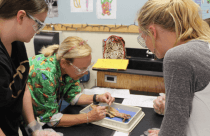How a Mentor Can Be the Wizard to a Researcher’s Success

Have you ever had a mentor? Alternatively, have you ever been a mentor to others? Perhaps you are hoping to find a mentor? Whatever your chosen path, a mentor could help you to find academic and career success.
The Role of a Mentor
So what is a mentor? The role varies but always involves support. The simplest type of mentor might be an academic tutor. However, being a mentor often means playing a profound role in the progress of the mentee.
A mentor guides their mentee, as well as share their experience and knowledge. They take an interest in their mentee’s well-being and their career. The mentor and mentee may have both a personal and professional relationship. A good mentor should be able to adapt their mentoring style, depending on the personal goals, culture, and background of their mentee.
A mentoring relationship may be formal (e.g., arranged by a school) or informal. Having a mentor is particularly crucial in the world of scientific research. A more experienced researcher can share their expertise with a recent graduate.
The Impact of Good Mentoring
Studies have shown that mentoring can boost the academic studies and career of the mentee. A robust mentoring relationship has been shown to help students persist in STEM studies. This is especially true for students from minority, racial, and ethnic groups.
Research has also found that a good mentor can help a student to adapt to college life, in the social as well as academic setting. In STEM, students with a good mentor view themselves as abler and see more value in the work they do. On the other hand, a poor relationship with the staff can cause students to lose interest in following a STEM career.
Undergraduate students who feel they have a good mentor are more likely to pursue further education, such as doctoral programs. They are also more likely to see themselves as STEM professionals. Both of these views show a more significant commitment to a research career.
Students from minority, racial, and ethnic groups seem to benefit the most from a strong mentor-mentee relationship. These students are more likely to attend graduate school and follow a research career if they have a good mentor.
The Research Training Experience: What is Ideal Mentoring?
The research training experience usually means graduate school and postdoctoral training. For many science graduates, this is the time when a mentor might be most important.
In an ideal world, mentors and mentees would be perfectly matched. Each would be able to select the other, based on scientific interests, personality, and other factors. However, in reality, this does not happen.
Usually, mentors must choose a student from those selected by their department. For the student, they may choose based on who has the resources available – both time and money – to be their mentor. At the same time, some academics who would like to be mentors may not have the resources they need to do so. There is often much competition for popular or successful mentors.
One way to help this situation could be to award training grants to students. These grants would move with the student, allowing a wider choice of department.
Mentors may struggle with a conflict of roles. For example, there might be little time for mentoring, along with other demands such as teaching or applying for grants. Managers could solve this by giving non-academic tasks, e.g., laboratory management, to other staff.
Mentors should guide their mentees to become independent researchers. They should try to avoid producing a copy of themselves. Instead, mentors can encourage students to develop their own research interests.
How Can Universities Support Mentorship?
Universities can help staff to become excellent mentors, and assist in the matching of mentor and mentee. Some colleges have formal mentoring programs. These are often designed to help students complete their studies.
The University of Michigan in the US has a program to match students with researchers. Students complete a year-long research program and an independent project. The program results in more students of all types staying with STEM studies. However, the effect was most substantial for male African American students.
Other schools help mentors to succeed by offering training. It is essential that mentors understand the different aspects of their role, including the academic and social aspects.
Colleges could also promote mentorship by rewarding good mentors, with salary increases or promotion.
How to Choose a Mentor
You have decided you want a mentor, but how to choose? As we have seen, a good mentor needs many different skills. Clearly, you need to look for someone with expertise in your chosen research area, and who can take on mentees.
A recent article recommends a “data-driven approach” to choosing a mentor. This means that you think about a range of factors before choosing a mentor. For example, you might look for a mentor with a strong track record of successful mentees. This is particularly crucial for postdoctoral mentors.
You might choose more than one mentor from different research areas. Studies have shown that mentees who use the expertise of different mentors are most likely to have a successful academic career. Also, if you are looking for a postdoctoral role, you might try to find labs that lack your chosen expertise.
The Life-Long Benefits of Mentoring
Right mentoring can have life-long benefits. These can be personal as well as professional. A recent study used 40 years of data to assess the benefits of mentorship. The researchers concluded that successful mentors train successful students. These students are more likely to pursue a research career, and may one day become great mentors themselves.
Do you need to know more about being a mentor? Try this Enago article.
What makes a good mentor? What are your experiences of being a mentee? What are your experiences with your mentor? Share your thoughts in the comments below.









